Eco Tips
Here are some easy actions we can all do for the Environment.
When we consider our need for "stuff" have we considerd the 7 R's? Could we instead:
Rethink
Repair
Refuse
Regift
Reduce
Reuse
Recycle
Small steps can make a difference - many tiny snowflakes when joined together can make a huge snowball!
You can access a pdf condensed version of this page here. You may also like to use our June 2024 Eco quiz for teenagers to engage with your young people.
Addressing Waste and Improving our Recycling
The best way to reduce wastage is to buy no more than we need; whether this is food, goods, and to recycle what we can. So, how do we go about this?:
Food:
So, what do you eat? Do you think about global warming when you go to the supermarket, look at the back of packets and see what you are buying? Or are you already well aware of how food consumption affects climate change?
Some of you will be vegan or vegetarian. And definitely having more of a plant-based diet is better overall for the climate and future of the planet. Buy seasonally. Buy ‘loose’ fruit and vegetables. But, be aware of ‘produced’ cheese and meat products. Be aware of monocultures. Beware of factory farming of eggs, and dairy products. However, overall – these diets are better for our health and the health of the planet.
Do you eat meat and fish? If you do, then buy local, organic, if at all possible, and eat less of it. The types of meat that are worst are those in fast-food chains and in ready-made meals.
So, why is meat and dairy worse for the environment? Cows produce a lot of methane (burping), though many new additives are being trialled to help that, and better farming methods can also reduce the climate impact. Goat’s milk, cheese and butter are alternatives which have lower carbon-output, as well as many vegetarian and vegan alternatives.
Mass production also takes land. Monocultures have resulted in huge areas of wild land being destroyed, with plants, insects and animals either disappearing or in severe danger of extinction. And local people suffer, losing their land, lifestyle, with increased risk of desertification and flooding (depending on the lands used).
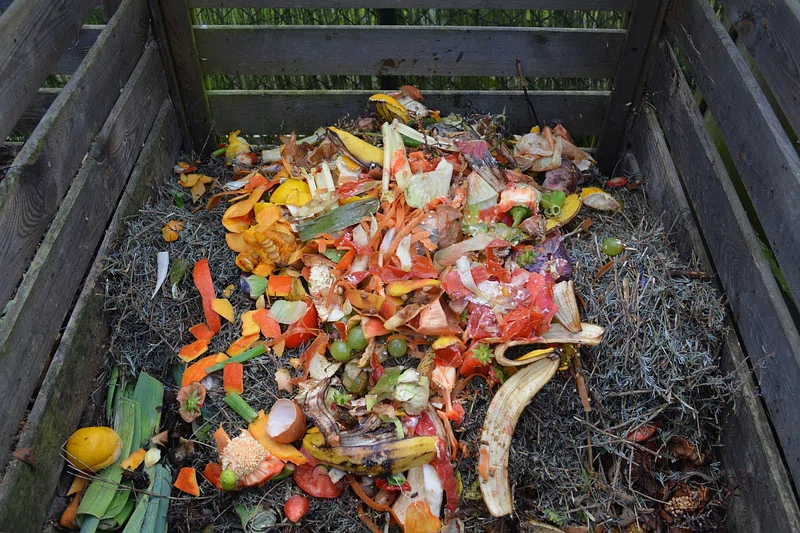
Food, like so many issues around climate change, is complicated. The better off can afford better diets, and can perhaps travel to farm shops or butchers (another issue!), whereas the poorest are likely to be reliant on Foodbanks with less choice and poorer options. But, the basic rules are simple; eat more plant-based food; waste as little as possible, and compost vegetable waste if possible; eat as much organic or well-sourced food and locally produced where possible. Reduce or remove fast-foods and pre-made meals from your diet. And think before you buy.
And use the LOAF principles (Local, Organic, Animal friendly and Fairly traded) (Green Christian) wherever possible. Always remember the poorest, both in this country and across the world, and our own responsibilities to them, and make changes. Many small actions make big changes. And as Christians, with our professed responsibility to the Marks of Mission and to care for our creation, we share a greater and more profound responsibility to all the world, to everyone and every living thing on this planet, and for the future. greenchristian.org.uk/loaf-principles
Food - Could We?
- As far as possible, buy foods according to the LOAF principles (Local, Organic, Animal-Friendly, Fairly Traded)
- Reduce consumption of meat and dairy products
- Pick and freeze; batch cook
- Plan meals, and try and shop once a week
- Buy ‘loose’ fruit and vegetables whenever possible or use own containers where possible.
- Buy local/ecological/organic foods whenever possible
- Buy milk and fruit juice in cardboard containers
- Try Goat’s milk or Oat milk
- Always have re-usable shopping bags
- Reduce takeaway meals
- Use a reusable coffee-cup
- Use wax food wraps/KeepLeaf sandwich bags
- Check the origins of meat/meat products
- Eat less processed food (better for us and the environment!)
Garden:
If you have a garden, compost the waste (barring perhaps certain weeds! – and those should be recycled by the local authority). It might be worth investing in a ‘chopper’, to speed the process up – and use it to ‘feed’ your garden (for free!). Do not buy peat-based compost. Buy organic and peat-free. Avoid tomato bags – you can buy the compost separately now (also organic and peat-free). Use recycled bags or pots. Good quality pots can be re-used for many, many years. Grow plants from seeds when possible rather than buying plants. Buy local if possible. Make sure you try and have as long a flowering period in your garden as possible. Re-wild at least part of your garden (longer grass, bulbs, wild flowers, rotting wood etc.), and a pond or water feature if possible. You will be astonished at the massive increase in insects, birds, reptiles and other creatures, even in a town. Make sure there are ‘holes’ in fences for movement of small mammals.
Friends of the Earth have produced a guide for year-round bee friendly plants.
friendsoftheearth.uk/nature/beefriendly-plants-every-season
Look out for the free Grow Wild seeds from Kew each year
growwild.kew.org/championing-nature/wildflowers/how-to-grow-wildflowers/how-to-sow-wildflower-seeds
Garden & Local Environment - Could We?
- Plant more trees and bushes
- Compost garden and food waste/cardboard and shredded paper (wormeries/compost bins/Hot Bins)
- Grow from seed/give away excess plants
- Have a ‘wild’ area = wildflowers/long grass/leave log piles and bin lids in sheltered areas
- Use the centre of toilet rolls as pots; reuse/recycle plastic pots
- Buy peat-free compost
- Use (and build if possible) bird boxes, hedgehog homes/hedgehog highways/
- Put in a garden pond or small water area that birds etc. can access.
- Use bio-degradable ‘poo bags’, and put them in the appropriate bins
- Buy environmentally-friendly dog and cat food – or make your own
Water:
Do not buy bottled water – use a re-usable bottle. Do not leave the tap running when you clean your teeth etc. Have shorter showers, and reduce the number of baths you have. If you water your garden, then consider water buts or surface water collection (rainwater harvesting – several companies now do this). Be careful what you put down the toilets, so you don’t cause blockages in the sewage system. Use recycled toilet paper (e.g. Who Gives a Crap – delivered to your door and helps 3rd world). You can even use the card tube insides for seed growing.
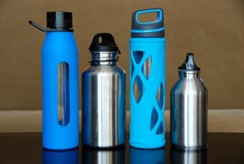
Water - Could We?
- Save on water
- Turn tap off when cleaning teeth etc.
- Use showers rather than baths; solid soaps/shampoos rather than liquid
- Wash full laundry loads /turn the temperature down/dry clothes on a line if possible
Clothes:
Do not buy unless you need something. Use ‘recycling’ websites where possible to buy items ‘new’ to you. Do not buy ‘for fashion’ but for use. Consider what materials you buy: it is difficult not to buy clothes that are not ‘plastic’ now, but cottons (and if you are a meat-eater) consider wool and leather products. Teach yourself how to make simple repairs to clothing or search out a repair café and someone who might help you. Recycle what is no longer wearable. Some charity shops now send clothes no longer wearable to be ‘remade’ in factories in the UK (e.g. Claire House).
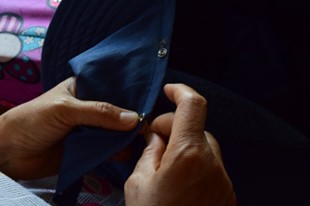
Clothes - Could We?
- Buy refurbished or second-hand
- Repair what you can (Men in Sheds)
- Recycle clothes to Charity Shops (Cancer Research/Claire House). All clothes are recycled if not suitable for sale (local Lancashire firm remakes material)
Electronic and Electric items:
Do not replace unless you need to. Every manufactured item has a ‘climate cost’ from the materials to manufacture, to shipping. Batteries contain lithium, cobalt and other ‘precious’ metals that are often mined with little respect for local peoples in the 3rd world (where the mines are often situated) and giving nothing back to the local lifestyles. Look to see where the items are manufactured.
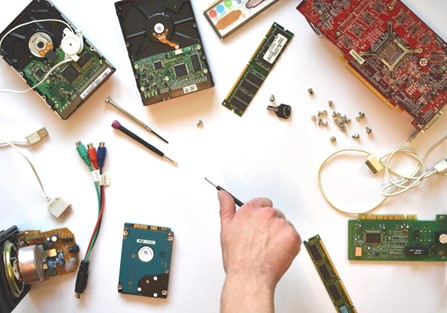
Do NOT put the small, round batteries in your rubbish – they explode if they get squashed when they get to recycling plants. ALL batteries must be responsibly recycled, and many of the metals can be retrieved and re-used.
See if there are local ‘repair shops’, or local companies that can repair your electric or electronic items rather than putting them in the local tip.
You can find a Repair Café in:
- Bramhall (1st Saturday Monthly Bramhall Methodist Church, 10.00-12.00)
- Biddulph
- Birchwood *
- Congleton *
- Marple *
- Wilmslow transitionwilmslow.co.uk
- Wirral www.repaircafe.org/en/cafe/wirral-repair-cafe/
* For information on the next Repair Café follow on Facebook
Please let the Outreach Environment Team know the place, time and date of any in your area.
Plastics:
Reduce your plastic waste. Buy home delivered items (there are many companies doing this now), which you just use to refill your containers for laundry, cleaning, washing, washing up, dishwashers etc. But – use up any plastic-contained liquids etc. first. The greener products we have tried so far have worked well. If you do have to buy plastics – make sure they are recyclable either with your local authority, or local supermarkets.
Let us know where you can refill your plastic containers. Here are a couple we know of:
- Waterhouse Quality Food – Mellor Road Cheadle Hulme
- Weigh of the World (used to be in Northwich and now online) www.weighoftheworld.co.uk
- Scoop and Scales Roe Street, Macclesfield.
Plastics - Could We?
- Use local ‘Plastic-free’ businesses and shops
- Use less plastic = refillable household cleansers, or ‘green’ products e.g. Splosh/Smol .
- Do not use disposable razors/other household items when ‘refils’ are available
- Use bamboo toothbrushes (Waitrose/Boots/Superdrug), or electric ones where heads are replaced – and recycle them – some manufacturers take them back (e.g. Philips)
- Buy a new phone/electricals only when you need them
- Boots recycle and reuse plastic make-up containers etc.
- Wetwipes are terrible for the waterways and our environment. Not recyclable – need to bin
- Toilet paper = ‘Who Gives a Crap’ (delivered free/helps 3rd world) Greencane toilet paper; Ecoleaf toilet paper (remember the danger of microplastics!)
Energy:
If you can – the best way to save power for your home is to insulate and draught-proof. Grants are now available from local authorities, so contact them. Once you reach a certain level of insulation, most houses can be heated with air-source heat pumps (ASHP’s). (Grants also available). You can retrofit underfloor heating, update radiators, but this requires investment. If you can – also invest in PVs (photovoltaic cells) – grants may also be available for these. Systems often now include a battery. Try and buy a ‘British” system, as they are manufactured here, and batteries often now don’t need cobalt, and some use recycled lithium. If you buy a new electrical item, make sure it is highly energy efficient. Hopefully, you can leave gas behind!
Simple savings: Turn off your lights when you leave a room; turn off items on standby; try and purchase an air-fryer and slow-cooker for cooking. Turn down your thermostat a bit, but don’t risk getting cold if you have babies, are older, or disabled. Wear an extra layer or two.
Think Green Energy suppliers. Monitor your power usage.
Household Energy - Could We?
- Reduce our energy use (A Rocha)
- Check if we are entitled to grants for heating/insulation/solar panels
- Turn radiators down/draw the curtains at dusk/take showers instead of baths
- Improve our home insulation
- Buy energy-efficient products, such as washing machines, when they need replacing
- Replace lightbulbs with LED
- Fit draught-excluders
- Switch to a ‘green’ energy provider
Cars and transport:
Don’t buy a new car unless you need one. Electric cars still have manufacturing costs, transport and materials needed, plus the batteries have a limited life. There is the issue still of mining metals in 3rd world countries. If you have to buy a new car however, electric is still the best option. But do not buy a huge SUV, they spray micropollutants from the tyres, are bad for the roads due to the weight. New technology for cars is on the horizon.
If you are able to – use public transport or cycle locally. Pressurise for better public transport where it is not available; also for safe cycle routes. Walk when you can. Work at home at least part of the time, and use Zoom or Google where possible to reduce travel.
Travel - Could We?
- Take a bus or cycle when possible
- Walk to school when possible
- Take less flights/holiday in the UK/Use the trains
Recycling:
Check what you can recycle in your own Local Authority (LA), and what happens to the rubbish when it is recycled (or not!). Make sure you pressurise your LA if they are not doing as much as they could. Use local recycling depots where you can rather than ‘putting things in the bin’. Do NOT dump unless the item really cannot be retrieved/repaired and make sure it is properly disposed of. Remember there are charities that will take good-quality second-hand furniture and household goods that will help those who are struggling (e.g. Besom (Wirral).)
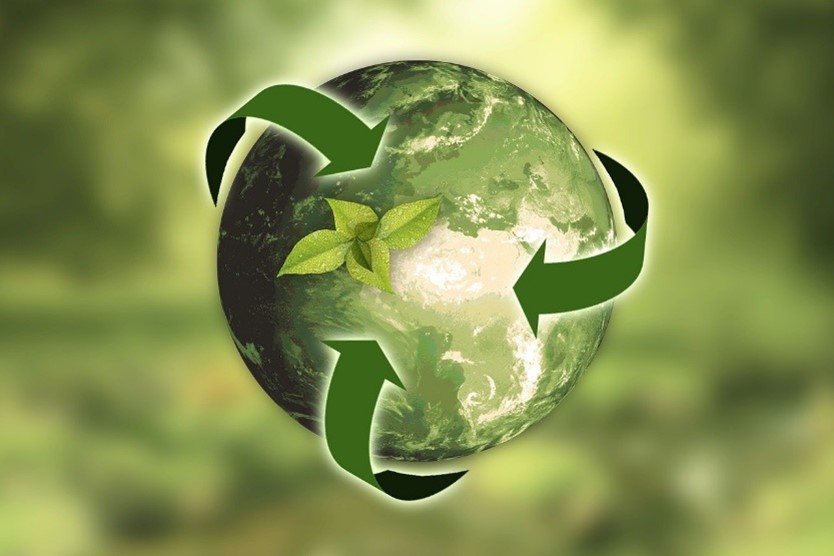
Remember: every small action counts.
Think before you buy: The world is on a climate precipice. Every action we take will make a difference for everyone living now, for future generations, for the standard of living of everyone across the world. Do not be afraid to pressurise; write to your local politicians or MPs. (members.parliament.uk/findyourmp.
The more pressure governments and companies get, the more they are likely to invest in the green economy. Remember you can make a difference, and as Christians – we should be making a difference. We have a duty to our faith and to every living thing on this wonderful, beautiful, glorious planet. And time to save the world as we know is nearly up.
What else can we do?
- Communication is important – tell others what we are doing; ask them what they are doing.
- Do NOT litter. Teach our children to value our plant.
- Use online for work; reduces the number of trees turned into paper
- Use online meetings whenever possible
- Buy refurbished or second-hand
- Follow eco tips (e.g Greenpeace/Friends of the Earth – available online)
- Actively support agencies and charities like Oxfam, Save the Children, Tearfund, and Christian Aid (and many more out there, small and large) and local charities like Foodbanks
- Support or join an eco group (or two) – they are fighting for everyone’s future
- Question supermarkets, oil and gas companies, water companies – go to the top! (www.info.co.uk/www.ceoemail.com/www.search-hq.com). They are responsible to us and the planet’s future
- Pensions - ask about ethical and environmental investments

